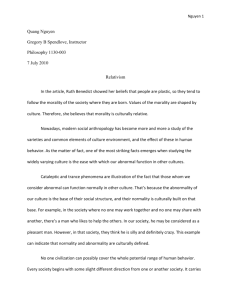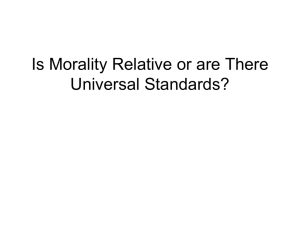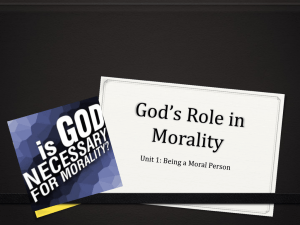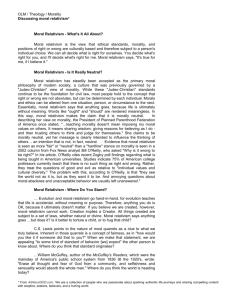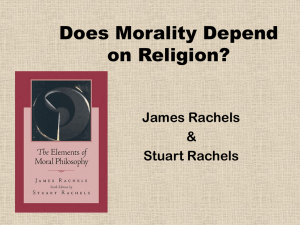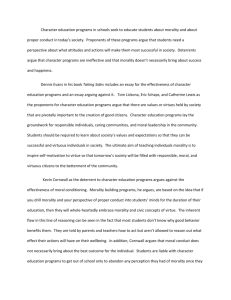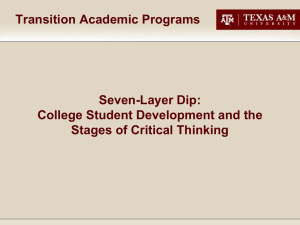File - Leadership Project and Capstone
advertisement
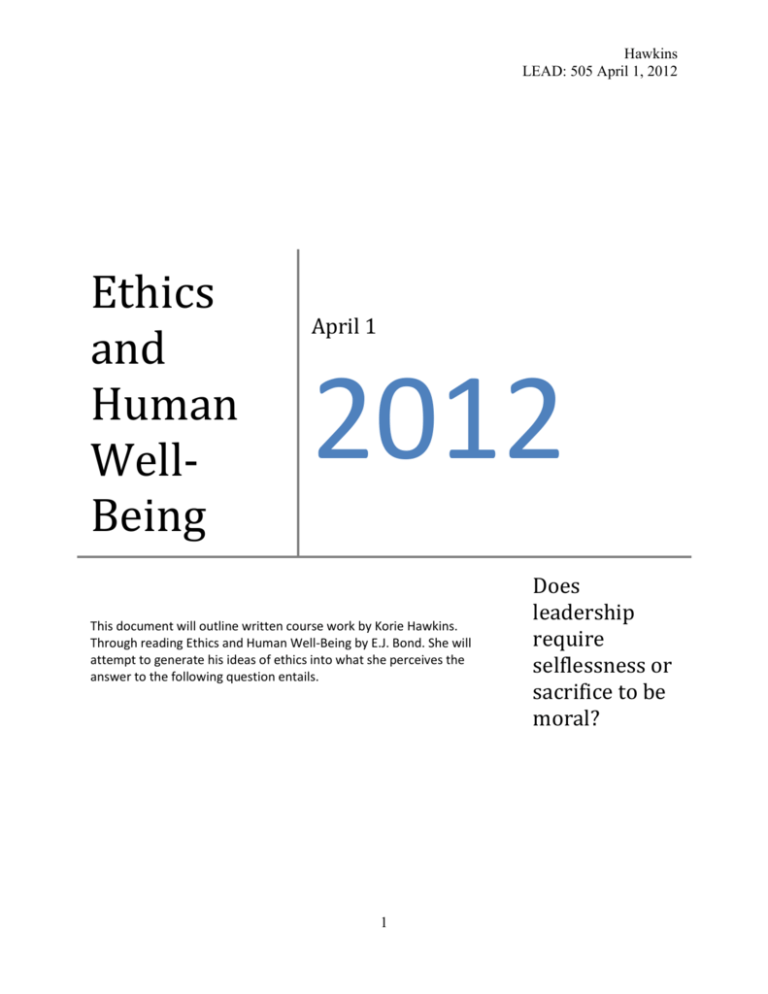
Hawkins LEAD: 505 April 1, 2012 Ethics and Human WellBeing April 1 2012 This document will outline written course work by Korie Hawkins. Through reading Ethics and Human Well-Being by E.J. Bond. She will attempt to generate his ideas of ethics into what she perceives the answer to the following question entails. 1 Does leadership require selflessness or sacrifice to be moral? Hawkins LEAD: 505 April 1, 2012 Abstract Utilizing information generated from E.J. Bond author of Ethics and Human Well-Being (1996) and written work submitted throughout the course of MSL 505: Organizational Leadership Ethics I will attempt to answer the posing question: Does Leadership require selflessness or sacrifice to be moral? 2 Hawkins LEAD: 505 April 1, 2012 Introduction The overall scope of philosophy is not to take matter versus opinion, but to simply acknowledge the information set forth and apply it according to self. Bond said, “Psychological egoism is based on an easily discernible confusion of thought and opposing views are to be expected.” My intentions are to layout an outline of what I conceived from the reading, and construct a base for why I have concluded my opinion. My overall information streams from the author, scholarly articles, and my own experience. Synthesis My overall objective is to outline with support from my course work, my overall conclusion on whether or not leadership requires selflessness or sacrifice to be moral. To be conceived as morally good or bad, one must first be judged by the commons. The judgment of one is based off of conduct, and character. These two components infiltrate what is referred to by Bond as, Eudaimonia. He states, “Eudaimonia is all the non-moral values that are worth a person’s having, getting, or doing, and related to that person’s thriving, flourishing, happiness, or well-being (p.119).” Concluding that morality set forth by the commons neither here nor there is selfless or sacrificial, because we all are striving to be fulfilled morally. Ethical Egoism When it comes to matters of Ethics, one will often question, if people are out to help others or better themselves through helping others? Bond clearly states (1996) “egoism” claims that all human motivation is self regarding (p.8)” We as people have a set morality given our surroundings. This morality sets the tone for our ethical egoism, and bottom-line how it can and 3 Hawkins LEAD: 505 April 1, 2012 will be perceived. Referencing a situation I encountered with my district manager inquiring, “If I liked to be praised?” My response was, “I am who I am with or without acknowledgements, so praise is not required, but always accepted.” I received satisfaction in that moment because I made her believe, I was fully equipped to lead/manage in my workplace. Concluding the keyword is “motivation,” which is what is applied to psychological egoism. I related my personal experience with the reading to provide the understanding framework of what I believe egoism is and can be conceived as. The idea of psychological egoism to be true in everyday situations, it just depends on how the message is received and decoded. Psychological Egoism displays conduct and implies the over character of an individual. Cultural Relativism Cultural Relativism is the view that there is no overall morality view for humanity. The view is different given the time and place. Bond says (1996) “It cannot be true by definition that to be morally good is to do the done thing and never to do anything that is not done.” (p.24) My experience leads me to believe, society sets forth our overall morality, of course aside from our own beliefs. Cultural relativism is established through norms, and those norms formulate through a given society. The norms are made up of other deciding factors such as religious beliefs, government, laws, and so forth. Overall society builds the foundation of what morality essentially is. Resulting in the cultures eudaimonia (well-being), and giving cultures a deonitc way of living. According to Bond, deonitc is a dimension of morality establish through law. As long as we follow those laws, we will be conducive to the commons. Morris Ginsberg (1970) ask, who says that morality is universal in the formal sense that everywhere we find rules of conduct prescribing what is to be done or not to be done (p.578)? Placing my position to side with what cultural relativism entails Beyond Cultural Relativism by Martin Gardner reflects on 4 Hawkins LEAD: 505 April 1, 2012 past civilization created and how “—the view that there are no standards of "good" and "bad" other than the laws and customs of a given culture.” (p.38) It is our job as individuals to take what we know as our own cultural relativism, be willing to share outside our culture, and be open-minded to what others may share with us. Thus, building character and reevaluating our conduct. Subjective Relativism Bond clarifies the differences between cultural and subjective relativism. Cultural relativism deals with local ethical or morality matters versus subjective relativism deals with morality being a personal matter. According to E.J. Bond, the driving force behind subjective relativism “is precisely its rejection of what is seen as socially imposed morality.” (p.50) My personal experience of subjective relativism would be considered my opinion. My opinion is formed through my culture, experiences, and morality overall. In general, my subjective relativism streams from whom I am as a person and what I stand for. Being a Realist about Relativism (In Ethics) by Geoffrey Sayre-McCord, highlighted a very important component, (1991) “To be a relativist in this sense is to hold that in many cases what's right or wrong, obligatory or forbidden, good or bad, depends in some way on the circumstances - on what expectations people have legitimately acquired, on what the available options are, on who will be affected, etc. If that is all that is involved relativism remains fairly uncontentious.” (p.161) Allowing me to conclude subjective relativism is one’s own opinion. So who am I to object to questions what Bond has concluded? Not only that, but he has a valid point. Bond references Hitler’s actions against the Jews, being justified due to Hitler’s overall relativism. If this is the case, then everyone is entitled to their own relativism, and it is up to one’s self to determine how that relativism will play out morally and socially. This will lead to the aretaic dimension of morality, it depicts virtues and vices. 5 Hawkins LEAD: 505 April 1, 2012 Judgment of character will be questioned, which is why one will need to stop and consider the overall eudaimonia of the commons. Relativism and Hutcheson’s Aesthetic Theory by Carolyn Wilker Korsmeyer where he clearly states subjective relativism as wrong. The reading helped me realize in general, subjectivism can lead to some dangerous things, and overall society has a lot to do with how we have grown to separate the differences between our own self subjections relativism versus our whole cultural relativism. My overall outlook concludes, subjective relativism is one’s own opinion and that opinion is formulated through life’s experiences. Humans choose how they will utilize their subjective relativism on a daily basis, and do so in order to please society majority of the time. “Man is the measure of all things of those that are, that they are, and of those that are not, that they are not,” according to Protagoras unfinished book Truths. Assuming my interpretation is accurate, what Protagoras was articulating to his readers is simple. Meaning, man determines one’s own reality, from that reality, man created one’s own morality. Through one’s morality relativism is distinguished and set forth. Bond said it best (1996), “There are no moral truths, only customs, beliefs, and practices.” The force driving the ethical frame of subjective relativism is the mere idea an individual can reject the moral concepts imposed by society. Unbeknownst to me, there is far more detail to being subjective when it comes to matters of being a “subjective relativist.” I discovered one’s morality is related to one’s personal conviction. A Subjective relativist overall frame of mind looks to one’s own nature, God is not a factor. Subjective relativists rely on themselves, creating their own morality, for which they are authority. Trusting in their own decisions, not being deceptive to themselves, they therefore create their own moral reality. My decisions and moral beliefs reside in biblical scripture, the Holy Bible, The Lord, and his son Jesus Christ. Therefore, I would have to agree with Gordon C. F. Bearn article, Relativism as Reductio, the overall view 6 Hawkins LEAD: 505 April 1, 2012 of subjective relativism seems like a mere assertion and can only be understood individually. Bearn highlighted in his article, “A point of view for each person, is true for that person.” (p.391) Tying the two together Bearn and Bond both emphasize and seem to agree on one thing, pure subjective relativism is consciously right for oneself. Emotivism “It lies in you, not in the object. So that when you pronounce any action or character to be vicious, you mean nothing, but that from the constitution of your nature you have a feeling or sentiment of blame from the contemplation of it. Vice and virtue, therefore, may be compar’d to sounds, colours, heat and cold, which, according to modern philosophy, are not qualities in objects, but perceptions in the mind...,” according to A Treatise on Human Nature (1739) by David Hume. The notion that moral language is utilized not to declare what persons attitudes are, but to express them in a non-state mental way is ascribe to as, Emotivism. Non-cognitivist claim such as these are neither true nor false. According to Bond (1996), moral utterances are expressions of character, but theses expressions do not imply anything at all, these utterances are rather more so like shouts and cries. Applying emotivism is not stating or affirming that he or she approves or disapproves of something. These individuals are simply committed to a certain principle of conduct; “Rather he or she is verbally but non-state mentally expressing or displaying (perhaps to himself or herself) that attitude or that commitment,” according to Bond (1996). The concept of emotivism is surprisingly sensible in my opinion. An individual says, “this is good,” but it doesn’t necessarily mean that “it is good”. It just evokes actions in others to apply that “this is good.” Emotivists matter-of-fact believe their claims are neither true nor false. 7 Hawkins LEAD: 505 April 1, 2012 It is pure and never used to make statements of assertions. Despite the fact it can be used in a persuasive matter of morality, it does not make one right or wrong. Meaning emotivist is judged harshly on character, because of their use of language. Prescriptivism “I cannot prescribe for myself without prescribing for humankind in general and therefore for myself,” according to Bond (1996). Stuart Hampshire (1949) established a metaethical theory tilted, Non-congnitivism: Prescriptivism. Prescriptivism is the ability to formulate practical moral judgments that are applied to personal commitment and to the overall principles set forth by man. These judgments contain imperative elements, and result in approval or disapproval based off the overall morality possessed by mankind. According to Prescriptivism and Rational Behaviour by J. C. Mackenzie (1968), “The limits to the use of moral concepts, even the most general ones, are logical, not merely practical. They are in no sense imposed upon each man by himself, but arise out of "the nature of things ". Not anything can be held as a moral belief or principle, no matter what the state of mind of the holder. The criteria for goodness and rightness are laid down, and no man is in a position to decide for himself what these are.” In order for an individual to make a practical moral based decision, one has to consult the overall morality of the universal. Meaning subjective relativism, and egoism, and all the other theories prior to this particular one go out the window. It almost seems impossible for an individual to even be qualified for such decision making. Prescriptivism requires one to think universal and that requires one’s own personal morality to become universalized by the approval or disapproval of all of mankind. 8 Hawkins LEAD: 505 April 1, 2012 Mackenzie elaborates on prescriptivism by saying, “The pre-scriptivist claims that words like 'good' and 'ought' have two sorts of meaning, descriptive and evaluative, that these are logically distinct, and that therefore the individual remains free to make his evaluations on the basis of descriptive criteria of his own choosing.” Meaning man is not capable of deciding for themselves what is right or wrong when it comes to moral judgments. Prescriptivism and Fairness by James P. Sterba align with Mackenzie article simply implying Hare’s theory to be ignorant and not fully thought out. Hare lacks the consideration of hypothetical situations, and the overall concept of theories pertaining to one’s own environment or religious belief. What is right for one does not necessarily mean, it is right for all. It is merely impossible to prescribe for an entire universe. Hare needs to reevaluate his theory, and consider the overall scope of morality and what it entails. Is/Ought Distinction During the eighteenth century David Hume claimed, that one could not logically derive an “ought from an “is.” Hume said, “For as this ought, or ought not, expresses some new relation or affirmation, ‘tis necessary that it shou’d be observ’d and explain’d; and at the same time that a reason should be given for what seems altogether inconceivable, how this new relation can be a deduction from others, which are entirely different from it.” “Ought” subjects an individual’s character to a particular action of moral obligation. This obligation has to involve practical reasoning and be based on values that can be achieved by action and choice. Perceiving this to be true, one cannot say that one “ought” to do something unless there is a reason behind it. Meaning the course of action has value of gain or loss. 9 Hawkins LEAD: 505 April 1, 2012 Further findings led to Ingmar Persson, A Consequentialist Distinction between What We Ought to Do and Ought to Try. He said, “We may compare, and contrast, what we ought to do with what we ought to believe. In the latter case, too, we could distinguish between what we ought in the evidential sense - or ought rationally - to believe and what we ought in the factual sense to believe, which is the truth.” (p.352) Unable to oppose is/ought distinction and the overall systematic theoretical context of what it entails leads me to believe “ought” is a subjective language. It is built around the establishment of what universal morality can be implied as, what one’s values should be, and how one should or shouldn’t apply it. The overall scope of is/ought distinction, reminds me of an egoism. The is/ought distinction cannot be relevant useless one has practical reasoning on how it is of value to another individual and provides some type of gain or loss. My connection between the two may be inconceivable, but ultimately the moral aspect of what one “ought” to do requires more reasoning. Serving The Common Good “Wherever there is a reason for a certain course of action, then one ought to take that course of action unless there is some over-riding reason why one should not (p.118)” Bond’s primary goal is to determine how moral ought judgment and other moral judgment might be grounded in practical reason. Non-moral values in an important sense are not subjective. These non-moral values are achievable by choice or action. Non-cognitivist claim differently, they believe an individual just so happens to function with a particular attitude or commitments. I found this to be contradictive, considering norms can be established by man, through various media, education, jobs, and religious outlets as some of the many commons. According to the 10 Hawkins LEAD: 505 April 1, 2012 authors of Common Fire: Lives of Commitment in a Complex World, society in non-conscious ways conform to a certain way of life and the foundation of most lives are found around the new commons. Many will argue; no one person has same values or beliefs. Nevertheless, our values of thriving, flourishing, or happiness (pertaining to well-being) is a positive for all. E.J. Bond believes, “Non-moral values attainable by choice are all related to one thing—the thriving, flourishing, happiness, or well-being of the person whose choice it is (p.119)” Eudaimonia, the concept consist of all non-moral values that decipher our course of actions. Bond continues his concept by utilizing examples of kindness, trust, and promise keeping to establish what most consider moral values. He elaborates on all these concepts, by outlining moral value, and its effect on the individual and others. Values worth having, getting, or doing must provide reason for self. But we cannot reach eudaimonia, without participating with our communities. “We are not acting for our exclusively individual or personal self-interest (p.129)” according to Bond. Meaning we are acting for the common good. The common good of our community revolves around our own personal well-being. Therefore, making the source of moral, non-moral and all value equivalent to eudaimonia. On the other hand, I am not sure eudaimonia, is a quality all people posses. Deonitc Morality Kant formulated this dimension through the requirements established by moral law. In turn concluding moral law was to be obliged, and through this an individual could gain worth. The overall scope of deonitc seems conceivable, but yet at the same time questionable. Deonitc consist of reasoning for or against a particular kind of action. This reason determines the course of action to be morally required or obligatory. Unless reasoning 11 Hawkins LEAD: 505 April 1, 2012 established by the commons does not permit justifiable. The simplest form of deonitc is the moral code, which essentially outlines do’s and don’ts. The paradigm of deonitc according to Bond is brought forth through the laws of the land (p.138). Presented to us by Moses, it outlined morality, it terms of how we as beings should conduct ourselves. Bond establishes the limitations of moral conduct by presenting various examples of stealing and promise breaking. Either or cannot be justified, because ultimately the result is in violation to the creditability of deonitc dimension. Ishtivadue Haji, Deonitc Morality and Control says, “Deonitc morality consist of judgments that actions are right, wrong, or obligatory.” He argues that “indeterminism cannot sanction judgment of moral responsibility (p.350.)” Meaning one is not responsible for action surrounding their morality, but the overall judgments of the commons that permit their course of action. In general, deonitc morality clarifies what one can do and should never do; leaving my overall viewpoint of the dimension questionable. Aretaic Morality Aretaic as one of the three dimensions that make up morality, the dimension fails to elaborate on the overall cultural aspect of evolving characterization. One may view bravery in light of standing firmly on belief; another may believe it as going against belief. In order for my position to be made, aretaic will have to clarify if all and any can assume good or bad character. Aretaic morality is a cultural development associated with virtues and vices desirable and undesirable by the commons. It distinguishes good or bad qualities of one’s character. Meaning the overall attributes that characterize an individual reside in practical reasoning, one will either be for or against eudaimonia (well-being). Vocabulary is the key component used to decipher another’s characterization, and through this relativism and culture can be associated. The great 12 Hawkins LEAD: 505 April 1, 2012 Albert Einstein once said, “Let every man judge according to his own standards, by what he has himself read, not by what others tell him.” Robert F. Card, Journal of Value Inquiry, supports this quote by clearly stating “we find it natural to explain differences in behavior by appealing to different character traits. In this way, we live in the shadow of Aristotelianism about character (p. 475).” In order to be classified or characterized as a virtuous individual one must act accordingly to what others determine those traits as. To be vicing, can be debatable, considering there are means as to why one is characterized in that notion. In many aspects the overall concept of aretaic morality is designed for the common good. It requires the commons to classify someone as value, and it also predetermines one’s character. Character is formulated through actions, and actions are designed to portray exactly how we as human’s act. Aretaic morality cannot be built around the eudaimonia of all, because it does not address the well-being of all involved. Categorical Imperative Categorical imperative basically states one should not do, what one would not want another to do morally. Xiaomei Yang, Metaphilosophy says, “Moral requirements are the most demanding, if not always overriding, standards for conduct, for interpersonal and intercultural criticism.” Meaning this is an individualist concept way of thinking and overall the commons factor if one is moral. Bond claims categorical imperative is the recognition of the reality of other people, and the realization that things are no different from them than they are for us. Categorical imperative helps create eudaimonia because it allows others to live comfortably. Bond clearly states, “The good of the community is what is being aimed at, but the good of the community is part of the good of every individual, and is seen as supreme value, which all other value providing reasons for choice depends (p.177).” 13 Hawkins LEAD: 505 April 1, 2012 Categorical imperative seems to grasp the grist of what one’s intentions are and need to be in order to achieve both aretaic and deontic morality. One should act accordingly to his or her own morality; in turn apply categorical imperative to ensure individual and social eudaimonia. Conclusion Through this reading I have learned about key components and theories that factor into leadership and the over context regarding one’s ethics. Bond assisted me, in answering a very vital question I wondered for so long. Why do I want to be a leader? Although it may be claimed a self-regarding, being a leader is a virtue. The call to serve requires an individual’s morality to be aware of others and the way they think. Even if they are an egoist, cultural relativist, subjective relativist, all of these people make up our society. It is up to us as leaders to depict how they utilize it. Human want to have eudaimonia, it is created by morality and how we as people conduct ourselves. “The study of leadership is the study of how men and women guide others through adversity, uncertainty, hardship, disruption, transformation, transitions, recovery, new beginnings, and other significant challenges,” according to Jim Kouzes and Barry Posner. Ethics and Human Well-Being served as a guide to exploring what morality is and consists of. All the components connect to the eudaimonia of how humans function. Bond successful persuades my overall opinion to believe leadership is neither selfless nor sacrificial, and to be moral streams from one’s overall take on conduct and character. Creating eudaimonia for all, and all who dwell in it, to achieve some type of leadership. 14 Hawkins LEAD: 505 April 1, 2012 References Bond, E. (1996). Ethics and Human Well-Being. Cambridge: Blackwell Publishers. Bearn, G. C. (July 1985). Relativism as Reductio. In Minds (pp. 191-193). Oxford University Press. Card, R. E. (2004). Pure Aretaic Ethics and Character. The Journal of Value Inquiry , 473-484. Daloz, L. A., Keen, C. H., Keen, J. P., & Parks, S. D. (1996). Common Fire lives of the commitement in a complex world. Boston: Beacon Press. Gardner, M. (1950). Beyond Cultural Relativism. Ethics , pp.38-45. Ishtiyaque Haji, Deontic Morality and Control (Cambridge: Cambridge University Press, 2002), pp. xiv + 288. Korsmeyer, C. W. (1975). Relativism and Hutcheson's Aesthetic Theory. Journal of the History of Ideas , 319-330. Lazari-Pawłowska, I. (1970). On Cultural Relativism. Journal of Philosophy , pp. 577-585. Sayre-McCord, G. (1991). Being a Realist about Relativism (In Ethics). Philosophical Studies: An International Journal for Philosophy in the Analytic Tradition , 155-177. Mackenzie, J. ((Oct. 1968)). Prescriptivism and Rational Behaviours. The Philosophical Quarterly , pp.310-319. Persson,Ingmar.Utilitas,Sep2008,Vol.20Issue3,p348-355,8p;DOI: 10.1017/S0953820808003191 15 Hawkins LEAD: 505 April 1, 2012 Sterba, J. P. ((Feb. 1976)). Prescriptivism and Fairness. Philosophical Studies: An International Journal for Philosoph in the Analytic Tradition , pp. 141-148. 16

